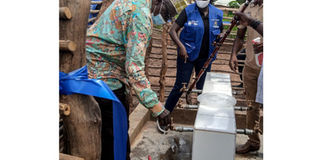85,000 refugees in Adjumani to benefit from piped water

The first deputy Prime Minister, Gen Moses Ali, commissions a public water supply to refugees at Ayilo II, Pakele Sub-county in Adjumani District on Tuesday. PHOTO BY BILL OKETCH
At least 85,830 refugees and host communities will benefit from three piped water supply systems established by government in Adjumani District.
The projects, which consist of yard connections and public stand posts, are aimed at easing access to safe and clean water at Ayilo II, Nyumanzi and Alere refugee settlements and the host communities.
The supply systems were on Tuesday handed over to the umbrella of Water and Sanitation–North for operation and maintenance to ensure efficiency and sustainability.
The initiative is part of a broader support programme for refugee settlements and host communities in northern Uganda (SPRS-UN) WASH Component.
The €4.9 million (Shs21b) intervention, which is financed by the European Union through European Union Trust Fund, is being implemented by the Ministry of Water and Environment under the Water and Sanitation Development Facility – North. The fund is managed by the Austrian Development Agency.
Under this WASH component, five other piped water supply systems have been constructed in Ranch I, Bidibidi Zone V, Ofua III, Omugo VI, and Olujobo/Tika refugee settlements.
The Ministry of Water and Environment said the whole idea is to look after about 145,000 people who are in refugee camps and host communities.
The ministry’s permanent secretary, Mr Alfred Okot Okidi, is optimistic the intervention will reduce water-borne diseases.
“And our mothers and sisters will not have to walk long distances to look for safe water. The water will be right there!” he said at the commissioning of Ayilo II piped water supply system in Pakele Sub-county on Tuesday.
Mr Okot added: “Children can go to school when the schools finally reopen without having to be bothered by looking for water several kilometres away.”
People will pay Shs10 per jerrycan (for 20 litres) compared to about Shs200 to Shs500 which they have been paying for one jerrycan of unsafe water, the permanent secretary said.
“This is a huge reduction in cost for the refugees and the host communities. And from the experience that we have seen, actually the refugee communities are actually paying 100 per cent of their [water] bills compared to the host communities,” he added.
The First Deputy Prime Minister, Gen Moses Ali, said the project is time saving. “That is an achievement!” Gen Ali, who is also the Adjumani West Member of Parliament, said.
Ms Teresa Bol, the vice chairperson of Ayilo II Refugee Settlement, also a refugee from South Sudan, applauded government for the intervention.
She said some people would stay for many days without bathing. “Some refugees have been drinking unsafe water from the streams, and they would be attacked by members of the host community on the way to the streams,” she told Daily Monitor.
Mr John Asing Apam, the chairperson of Ayilo II Settlement Camp, said people have been fighting at water points.
Mr Charles Kiwalazi, the Adjumani assistant WASH officer with UN refugee agency – UNHCR, said: “Most of the settlements are in places where potential for ground water is not okay, so when we have a good yielding production well like this one [at Ayilo) having it motorised helps us to serve the people very well.”
Ms Roswitha Kremser, head of office, Austrian Development Cooperation, said: “I have trust that this [project] will be well used for the good of both refugee settlements and the host communities.”




